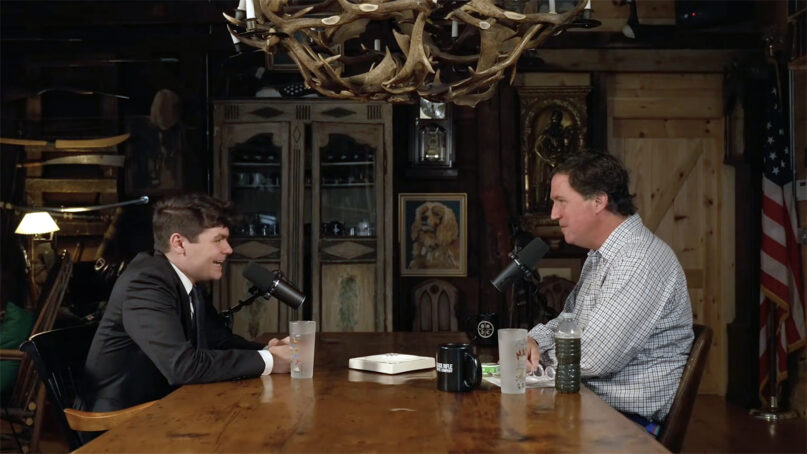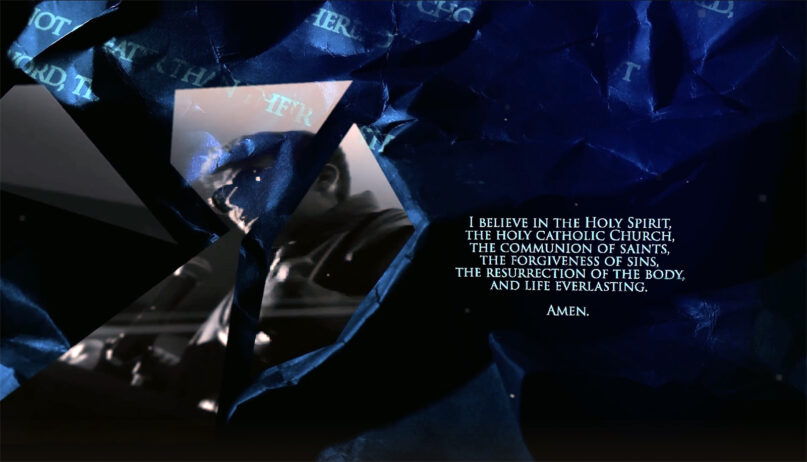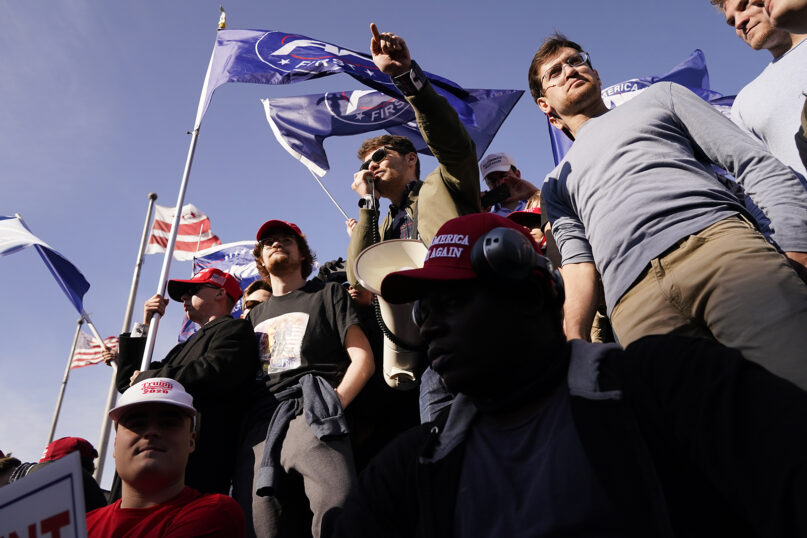(RNS) — Until this month, official Washington could still claim to know little about Nick Fuentes, the 27-year-old Christian nationalist whose livestreamed talk show, “America First,” draws half a million viewers and who has a million followers on X. Many of them are fans who call themselves “Groypers” and have been known to do Fuentes’ bidding, most notably on Jan. 6, 2021, when a boisterous group of young supporters gathered near the White House chanting, “Christ is king!”
Fuentes was also on hand that day, and a year later was subpoenaed by the House of Representatives’ Select Committee to Investigate the January 6th Attack on the U.S. Capitol. There is no evidence he entered the building during the attack, but the committee cited his “promoting unsupported claims about the election, including at the November 14th, 2020 Million MAGA March in Washington, D.C. and the December 12th, 2020 Stop the Steal rallies.” (He did not comply with the subpoena.)
Ten months afterward, in November 2022, Fuentes sat at a Mar-a-Lago dinner with then-former President Donald Trump in the company of Ye, the musician formerly known as Kanye West.
On Sunday (Nov. 16), wading into a controversy caused by Fuentes’ appearance on Tucker Carlson’s podcast, Trump — back in office again — said he “didn’t know much about” Fuentes but defended Carlson’s right to interview him, without specifically mentioning the imbroglio Fuentes caused by airing his concerns about “organized Jewry in America” and U.S. policy toward Israel. Carlson either didn’t object to or signaled his agreement with much of what Fuentes said, drawing accusations of antisemitism.
Trump’s claim of ignorance about Fuentes echoed comments by Kevin Roberts, president of the Heritage Foundation, who in apologizing for his initial defense of Carlson said he “hadn’t kept up with the news” and had relied on a script prepared by an aide. He also reportedly told Heritage staffers that he “didn’t know much about this Fuentes guy.”
No one in politics can credibly claim that now. After Roberts’ refusal to disavow Carlson’s decision to host Fuentes, Robert P. George, a professor at Princeton — and, like Fuentes, a Catholic — resigned on Monday from Heritage’s board, donors raised alarms and Roberts admitted he had “made a mess” of the situation and let the institution down.
Fuentes, meanwhile, held forth on an episode of his show titled “Kevin Roberts GROVELS to the Jewish Lobby” and wrote on X, “Thank you, Mr. President!”

Tucker Carlson, right, interviews Nick Fuentes recently. (Video screen grab)
As he explained to Carlson, Fuentes started his rise when, as a freshman at Boston University, he began livestreaming from his dorm room. After declaring that he had attended the Unite the Right rally in Charlottesville, Virginia, in 2017, Fuentes said he received death threats and left the school to concentrate on his show, which heralded Trump’s anti-immigrant views but often went further, warning of “white genocide” and celebrating the idea of “Catholic Taliban rule.”
In 2021, under the aegis of Fuentes’ America First Foundation, he began holding conferences where U.S. Rep. Marjorie Taylor Greene and other conservative politicians spoke.
Fuentes told Carlson that the first significant backlash he received for his show came from Republican Jewish commentators, including Ben Shapiro, who criticized Fuentes’ questioning of the party’s support for Israel. Fuentes said he faced a choice: “I could recant all my views, apologize, pretend to be one of them and bypass the gatekeepers, the sensors. Or I could kind of be in the wilderness and I would be alone and I would be radioactive, but I could challenge the credibility and legitimacy of the conservative movement.” That has been his mission ever since, he said. “The immovable standard is America first.”
RELATED: At least seven faith leaders arrested at Broadview ICE facility protest
The mission has led him to insist on biological difference between races, express admiration for Adolf Hitler and mock the rights of women, while claiming his critics are the bigots. Carlson was sympathetic during the interview: “It seemed like how when conservatives would critique anything about race, we got called racist,” he said. “Or anything about feminism, we got called sexist.”
Dormant for much of the past two years, America First Foundation announced its plan on Monday to resume operations in 2026, while asking for donations. “Through our events, publications, and fellowships,” the website reads. “We are building a formidable network of activists and thought leaders committed to preserving our nation and reclaiming our independence.”

Religious text and imagery is used in the “America First” online waiting room. (Video screen grab)
Every weeknight as Fuentes’ viewers wait for the livestream to begin, they are treated to photos of Fuentes in his trademark black sunglasses and scrolling text from the Apostles’ Creed — the ancient statement of Christian faith — or images of Christ and lines from Scripture. Catholicism is at the heart of Fuentes’ message, and he often offers guidance to his audience about their faith.
Westley S. is a 22-year-old fan of the show from Arizona who was baptized into the Catholic Church in April and is a part of a Groyper Reddit group. “I think my generation recognizes what the absence of faith has done to our country,” he said. “Because of that, we attach the movement to a return to Christian values.”
Westley said his immigration views align more closely with Fuentes’ than with the Vatican’s. “I don’t support Pope Leo’s outspokenness on being pro-immigration,” Westley said.
Parrotting themes Fuentes has aired on his show, Westley continued: “These people for the most part are not fleeing persecution or are starving. They’re coming to America to make more money and have a better quality of life. This in turn is resulting in blood and soil Americans’ quality of life declining. This is a political issue, not a humanitarian (one). … As long as Trump and ICE continue the deportations humanely, I support them.”
Fuentes’ proximity to power, and his ability to reach millions of young people, raises difficult questions for Catholic institutions and other Catholic media. As he frames his alt-right politics in the language of Catholic tradition, promoting what he calls a “return to Christian moral order,” some Catholic leaders worry his movement exposes a crisis of authority for the church in the digital age.
“The Catholic Church is an ancient and medieval institution, and its structure reflects that,” said Steven P. Millies, director of the Bernardin Center at Catholic Theological Union in Chicago. “Anybody can grab the Catholic brand.”
RELATED: He’s a young millennial Catholic priest; of course he’s a social media influencer

Montse Alvarado. (PRNewsfoto/EWTN Global Catholic Network)
Montse Alvarado, president of EWTN, the world’s largest Catholic broadcasting network, with an audience of 64 million, said Fuentes’ discussion of Catholic identity caught her attention, but she began monitoring his show more closely after the Oct. 7, 2023, attack by Hamas on Israel, when, she said, “weird online discussions on behalf of Catholic communities aligned with the far-right” took “an ugly turn.”
Fuentes’ rise among young Catholics, she said, particularly points to the church’s failure to provide “correct” and “well-formed” voices on the issues of antisemitism and immigration readily available to young men.
“If you were to ask me, I would like to see every Catholic leader of a major organization come out and say, this was wrong,” Alvarado said. “We should apologize and make a plan to move forward.” For its part, she said, EWTN is countering Fuentes’ message with information.
In December, according to Alvarado, the network will launch a new streaming service, an updated website and expanded news coverage, all designed to better engage younger audiences.
“EWTN was called for a time such as this, to walk into this space and push aggressively into the digital world to proclaim the truth and the eternal word,” Alvarado said. “That’s what’s going to help. You don’t have to counter hate with hate. The joy of the gospel speaks for itself, and young men need to hear that.”
Fuentes has challenged Nostra Aetate, a landmark 1965 Vatican document that affirmed the shared spiritual heritage between Catholics and Jews, condemned antisemitism and renounced the notion of collective Jewish guilt for the death of Jesus. Pope John Paul II emphasized its teaching, calling Jews the church’s “elder brothers in faith.”
For more than a month, the network has aired programming on antisemitism and Holocaust history, featuring Jewish scholars and historians, in an effort to counter what she calls Fuentes’ “dangerous rhetoric.”
“With Nick, it’s been concerning to watch him dive deep into a pre-John Paul II understanding of who the Jewish people are and what the church calls us into as Catholics and more broadly as Christians,” Alvarado said.
Millies said that Catholic media networks such as EWTN and Ascension Presents, a 10-year-old YouTube channel with 1.2 million subscribers that stars the Rev. Mike Schmitz, have built the infrastructure for independent platforms where Catholic identity and political commentary overlap.
“Catholic media networks have really inverted the authority structure of the Roman Catholic Church across the last 50 years,” Millies said. “EWTN and the rest of them really proved that there could be a space for someone to define Catholicism apart from the church, apart from the canonical authority of a bishop or a pastor. EWTN and the rest of them were proof of concept.”
But Fuentes, Millies said, is part of that shift. The young influencer’s posts on social media often generate engagement comparable to those published by Pope Leo XIV. On TikTok, Fuentes appears to be expanding his reach among young women, helped by video edits that emphasize his looks.
Yet Catholic prelates are prone to betray as little acquaintance with Fuentes as political leaders. At the U.S. Conference of Catholic Bishops’ annual fall meeting last week, Cardinal Blase Cupich, the archbishop of Chicago, told Religion News Service in response to a question, “I don’t know much about him, but I think that anyone who espouses approaches to civic life that demean people should be rejected by the public.” (Fuentes lives just outside Chicago.)
Cupich said that he does not believe the moment has yet come for him to intervene directly and that he would speak publicly only if Fuentes began invoking the church’s authority to legitimize his views.

Nick Fuentes, center, speaks to supporters of President Donald Trump during a pro-Trump march Nov. 14, 2020, in Washington. (AP Photo/Jacquelyn Martin)
“I think that it would be a real stretch for anyone to make the case that Catholics believe this kind of thing,” Cupich said. “I think that if someone needs to be called out in a public way, especially if they’re using as a basis for their pronouncements their association with the Catholic Church, then I think there would be a moment for me to say something about that. I’ll just continue to watch that.”
RELATED: Catholic bishops tied to Trump’s Religious Liberty Commission voice criticism of administration
It is not only Catholics who are influenced by Fuentes, but those who follow him, no matter their faith, often speak as if Fuentes’ beliefs, and his willingness to discuss them, override their own faith stands.
Jonah, a 28-year-old Orthodox Christian from Tennessee who asked that his last name be withheld for safety concerns, said he discovered Fuentes two years ago through short Instagram clips. Jonah believes that many of Fuentes’ followers aren’t especially religious but said they might still be more inclined to trust Fuentes’ views because of his faith.
“A lot of people who follow him are maybe not practicing Christians, but they agree with Christian values and stuff,” Jonah said. “I tend to gravitate to people who share the same faith as I do because you’re standing on more solid ground than if you’re coming at things from a non-Christian perspective.”
Asked whether he believes Fuentes is racist or antisemitic, Jonah said no. “I just think there’s a lot of outside influence when it comes to the way that he’s perceived,” he said. “If it was true racism, it would contradict my religious beliefs. I think that he’s genuine, and he comes out of a place of truth. And when it comes to his Christian views, I believe that he’s being authentic.”
Aleja McCain-Hertzler contributed to this story.



